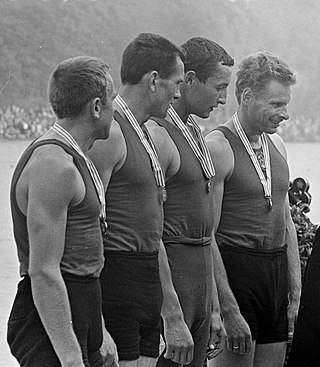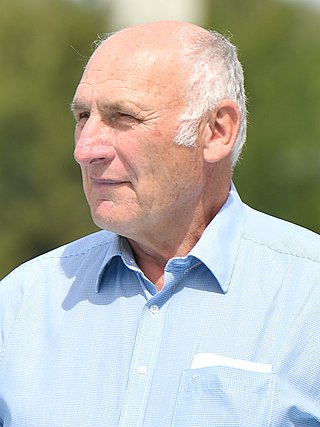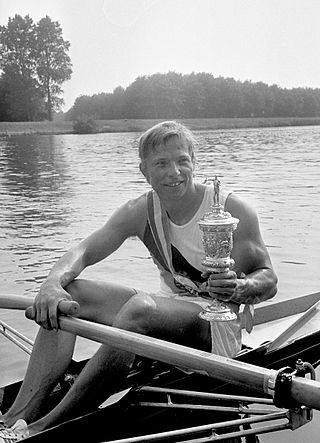Romano Sgheiz is an Italian competition rower and Olympic champion.
Ivo Stefanoni is an Italian rowing cox and Olympic champion.

Horst Meyer was a German rower who was most successful in the eights. In this event he won a silver and a gold Olympic medal, two world titles, and four consecutive European titles (1963–1967).

Egbert Hirschfelder was a German rower. In 1963–1964 he won a European title and Olympic gold medal in the coxed four. He then changed to eight event and won another European title in 1967 and Olympic gold medal in 1968.
Kraft Schepke was a German rower who competed for the United Team of Germany in the 1960 Summer Olympics.

Karl-Heinrich Erich Moritz von Groddeck was a German rower who won three Olympic medals for the United Team of Germany: a silver in the coxed pairs in 1956 and a gold and a silver in the eights in 1960 and 1964, respectively. He also won one world and five European titles in these two rowing events between 1956 and 1964 for West Germany. In 1964 he retired from competitions.
Karl-Heinz Hopp was a German rower who competed for the United Team of Germany in the 1960 Summer Olympics.
Fulvio Balatti was an Italian rower who competed in the 1960 Summer Olympics and in the 1964 Summer Olympics.
Giovanni Zucchi was an Italian rower who competed in the 1956, 1960, and the 1964 Summer Olympics, winning bronze in 1960. He won five gold medals at European Rowing Championships.
Robert Dumontois was a French former rower who competed in the 1960 Summer Olympics and in the 1964 Summer Olympics.

Thomas Ahrens is a retired German coxswain who was most successful in the eights. In this event he won a silver medal at the 1964 Summer Olympics, a world title in 1962, and two European titles in 1963 and 1964.
Jürgen Oelke is a retired German rowing coxswain who had his best achievements in the coxed fours. In this event he won a world title in 1962, a European title in 1963 and a gold medal at the 1964 Summer Olympics.

Antanas Bagdonavičius was a Lithuanian rower. He competed for the Soviet Union at the 1960, 1964 and 1968 Summer Olympics, winning a silver medal in the coxed pairs in 1960 finishing in fifth and third place in the eights in 1964 and 1968, respectively. Between 1961 and 1967 he won three gold and four silver medals at European and world championships.

Zigmas Pranciškus Jukna was a Lithuanian rower. He competed for the Soviet Union at the 1960, 1964 and 1968 Summer Olympics, and finished in second, fifth and third place in the coxed pairs, eights and eights events, respectively. Between 1961 and 1969 he won three gold and five silver medals at European and world championships. Starting from 1971 he worked as a judge with the International Rowing Federation.

Igor Aleksandrovich Rudakov is a Russian former coxswain who competed for the Soviet Union in the 1960, 1964, 1968, and in the 1972 Summer Olympics.

Volodymyr Ivanovych Sterlyk is a retired Ukrainian rower. He competed for the Soviet Union at the 1964, 1968 and 1972 Summer Olympics and finished in fifth, third and fourth place in the eights, eights and coxed fours events, respectively. Between 1963 and 1971 he won two gold, four silver and one bronze medals at European and world championships.

Juozas Aleksandras Jagelavičius was a Lithuanian rower. He competed for the Soviet Union at the 1964 and 1968 Summer Olympics in the eight and finished in fifth and third place, respectively. Between 1963 and 1969 he won two gold and five silver medals at European and world championships. In 1965 Jagelavičius graduated from the Vilnius Pedagogical Institute and starting from 1972 worked as a rowing coach. His wife Genovaitė Strigaitė was also an international rower.

Hans-Johann Färber is a German rower who competed for West Germany in the 1968 Summer Olympics, 1972 Summer Olympics and in the 1976 Summer Olympics.

Wolfgang Güldenpfennig is a retired East German rower who competed at the 1972 and 1976 Summer Olympics. In 1972 he won a bronze medal in the single sculls event, whereas in 1976 he became Olympic champion in the quadruple sculls. Güldenpfennig won two world titles in the quadruple sculls, in 1975 and 1977, as well as a European bronze medal in the single sculls in 1973. After retiring from competitions he worked as a rowing coach, training Karl-Heinz Bußert, Uwe Heppner, Uwe Mund and Martin Winter.

Günter Bergau is a retired German rower. He competed for the United Team of Germany at the 1964 Summer Olympics in the coxed pairs and for East Germany at the 1968 Summer Olympics in eights and finished in seventh place in both events. Bergau won a gold and a silver medal at the European championships in 1964 and 1967. In the doubles his rowing partner was Peter Gorny, whereas his coxswain in all events was Karl-Heinz Danielowski.









